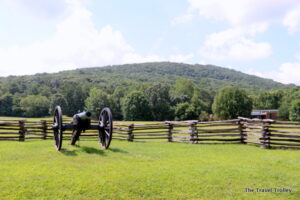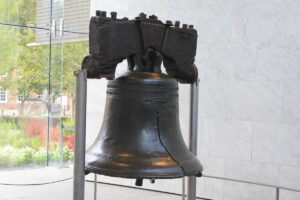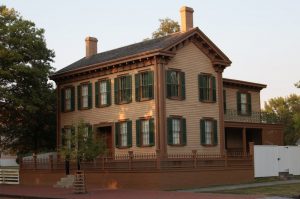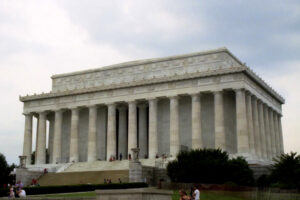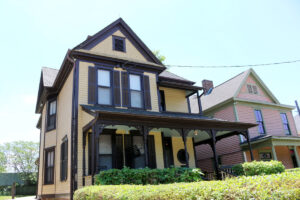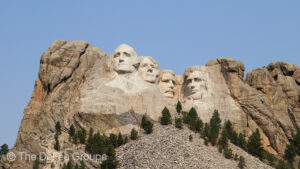Kennesaw Mountain National Battlefield Park offers the opportunity to connect with an important time in American history and a free outdoor experience. Located between Marietta and Kennesaw, the 2,923-acre national park offers visitors the chance to learn about an important time in history and also enjoy the great outdoors. The national park features 18 miles of walking trails, some rather steep as they approach the top of the mountain. The park features three battlefield areas: one located in front of the Visitor Center, another off Burnt Hickory Road and the main site at Cheatham Hill, which during the Civil War was called the Dead Angle. The visitor center is a logical place to start because it provides an abundance of information about what happened during the battle.
Of all the nation’s symbols, none may be as enduring as the Liberty Bell. A Philadelphia institution for two-and-a-half centuries, the bell’s story is as much fiction and folklore as it is a fact. Initially cast in 1752 by the Whitechapel Bell Foundry, a British foundry still in operation today, the bell arrived in Philadelphia in August 1752, cracked on its first use. A pair of founders, John Pass and John Stow, offered to recast the bell. Even though neither was an expert in bell casting, the two broke up the bell, melted it down and recast it after adding copper to the mix to strengthen the metal. What emerged was the Liberty Bell.
President Richard Nixon authorized the Lincoln Home National Historic Site Aug. 18, 1971. The park was formally established on Oct. 9, 1972, to preserve and protect the only home ever owned by President Abraham Lincoln. In total, the park’s buildings make up four-and-a-half square blocks on 12 acres. Among the buildings is the home where the 16th president of the United States lived from 1844 to 1861.
62701
The Lincoln Memorial is Washington is perhaps the most recognizable of all American monuments. This shrine to the nation’s 16th president, situated on the western end of the National Mall, was built between 1914 and 1922; it was added to the National Register of Historic Places on Oct. 15, 1966. Demands for a tribute to the murdered president date to the years just after his assassination, and the first monument in Washington, D.C., to Lincoln was erected in 1868. Over the years, the Lincoln Memorial has been the site a number of major speeches, including Martin Luther King Jr.’s “I Have a Dream” speech on Aug. 28, 1963.
20024
The Martin Luther King Jr. National Historic Site consists of several buildings and sites connected to King. They include his boyhood home, the original Ebenezer Baptist Church and Fire Station No. 6. The area includes a total of 35 acres and was designated as a National Historic Site on Oct. 10, 1980. The King Birth Home, located at 501 Auburn Avenue in the Sweet Auburn historic district, was built in 1895 and is located about a block east of Ebenezer Baptist Church. King was born here in 1929, and the King family lived in the house until 1941. Its was later converted into a two-family dwelling. The Rev. A.D. Williams King, the brother of King Jr., lived on the second floor in the 1950s and early 1960s. The visitor center offers free tours of the house led by National Park Service rangers. Fire Station No. 6 was built in 1894 and served the Sweet Auburn community until 1991. The fire station was an important community meeting place. A 1927 American LaFrance fire engine is on display at the museum.
30331
The Minuteman Missile National Historic Site includes three sites along a fifteen-mile stretch of Interstate 90 in Western South Dakota. Congress authorized the park in 1999 to preserve components of the Minuteman II intercontinental ballistic missile system. The site includes the Delta-01 Launch Control Facility, the missile silo at Delta-09 and the visitors center. “The Delta-01 Launch Control Facility provides a remarkable opportunity to view the front line of the Cold War,” Superintendent Eric Leonard said in a 2020 news release.
57567
Mount Rushmore National Memorial, located about 30 minutes southwest of Rapid City, features portraits of four presidents carved into granite — George Washington, Thomas Jefferson, Abraham Lincoln and Theodore Roosevelt. Measuring 60-feet-tall, the portraits are perhaps the definitive American attraction. Crews completed Mount Rushmore between Oct. 4, 1927, and Oct. 31, 1941. Sculptor Gutzon Borglum selected the four presidents to memorialize on Mount Rushmore. More than two million people visit Mount Rushmore, sometimes called the “Shrine of Democracy.”
Recent news releases from Mount Rushmore National Memorial:
- National Park Service Plans Prescribed Fire at Mount Rushmore National Memorial - Starling Basin
- Mount Rushmore National Memorial Offers Summer Programming
- Mount Rushmore National Memorial to Unveil New Visitor Center Movie and Theater Remodel on May 23, 2025
- New Outdoor Ethnobotanical Garden Expands Interpretive Storytelling at the Memorial
- Mount Rushmore Celebrates Independence Day with Variety of Events and Activities
The Ocmulgee National Monument preserves traces of over ten millennia of Southeastern Native American culture. Natives first came to the area during the Paleo-Indian period hunting Ice Age mammals. While many different cultures occupied this land for thousands of years, the centerpiece of the monument is a series of earthworks built before 1000 CE by the South Appalachian Mississippian culture, a regional variation of the Mississippian culture.
31217
37350
The Saguaro cactus is perhaps the most endearing symbol of the Sonoran Desert and the American southwest. Among the best places to see these marvels of nature up close is the 92,000-acre Saguaro National Park. There are two sections of the park: east (the Rincon Mountain District) and west (the Tucson Mountain District). President Herbert Hoover in 1933 used the Antiquities Act to establish the Saguaro National Monument, and President John. F. Kennedy added the Tucson Mountain District in 1961. In 1994, Congress combined the two districts to form the national park. Today, in addition to the stunning views, there are 165 miles of trails for visitors to explore.
85730

